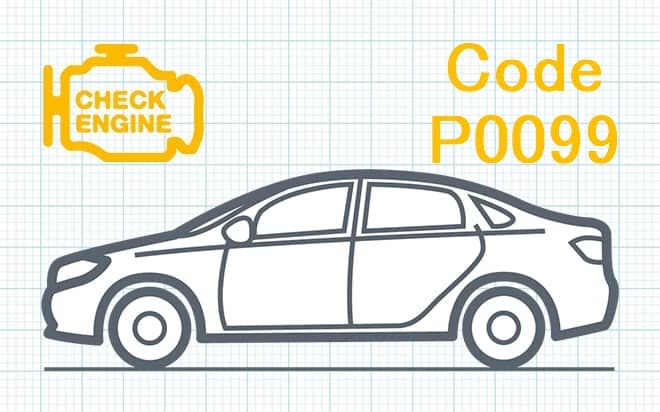
P0099 IAT Sensor 2 Circuit Intermittent
Content
P0099 IAT Sensor 2 Circuit Intermittent
OBD-II DTC Datasheet
Intake Air Temperature Sensor 2 Circuit Malfunction
What does this mean?
This Diagnostic Trouble Code (DTC) is a generic transmission code, which means it applies to all vehicles since 1996 (Ford, Mazda, Mercedes Benz, etc.). Although general, specific repair steps may differ depending on the brand / model.
A stored code P0099 means the powertrain control module (PCM) has detected an intermittent input from the # 2 intake air temperature (IAT) sensor circuit.
The PCM uses the IAT input and the mass air flow (MAF) sensor input to calculate fuel delivery and ignition timing. Since maintaining the correct air / fuel ratio (typically 14: 1) is critical to engine performance and fuel economy, the IAT sensor input is very important.
The IAT sensor can be screwed directly into the intake manifold, but more often it is inserted into the intake manifold or air cleaner box. Some manufacturers also incorporate an IAT sensor into the MAF sensor housing. In any case, it must be positioned so that (with the engine running) ambient air drawn into the intake manifold through the throttle body can flow continuously and evenly through it.
The IAT sensor is usually a two-wire thermistor sensor. The resistance of the sensor changes depending on the temperature of the air passing through the cold wire element. Most OBD II equipped vehicles use a reference voltage (five volts is normal) and a ground signal to close the IAT sensor circuit. The different resistance levels in the IAT sensing element cause voltage fluctuations in the input circuit. These fluctuations are interpreted by the PCM as changes in intake air temperature.
If the PCM detects a specified number of intermittent signals from the IAT # 2 sensor within a specified period of time, a P0099 code will be stored and the malfunction indicator lamp may illuminate.
Severity and symptoms
The signal from the IAT sensor is used by the PCM to calculate the fuel strategy, therefore the P0099 code should be considered serious.
Symptoms of a P0099 code may include:
- Slightly reduced fuel efficiency
- Decreased engine performance (especially during cold start)
- Oscillation or surging at idle or under slight acceleration
- Other control codes can be stored
reasons
Possible causes of this engine code include:
- Open or short circuit of the wiring and / or connectors of the IAT No. 2 sensor
- Defective intake air temperature sensor # 2.
- Defective mass air flow sensor
- Clogged air filter
- Breakage of the intake air intake pipe
Diagnostic and repair procedures
A good starting point is always to check the Technical Service Bulletins (TSB) for your particular vehicle. Your problem may be a known issue with a known manufacturer-released fix and could save you time and money while troubleshooting.
When faced with a P0099 code diagnosis, I like to have a suitable diagnostic scanner, digital volt / ohmmeter (DVOM), infrared thermometer, and a reliable source of vehicle information (e.g. All Data DIY) at my disposal.
Connect the scanner to the vehicle's diagnostic socket and retrieve stored DTCs and corresponding freeze frame data. I usually write this information down in case I need it later. Clear the codes and test drive the vehicle. If the code resets immediately, continue diagnostics.
Most professional technicians begin by visually inspecting the wiring and connectors associated with the IAT sensor (don't forget the air filter and air intake pipe). Pay particular attention to the sensor connector as it is susceptible to corrosion due to its close proximity to the battery and coolant reservoir.
If the system wiring, connectors and components are in working order, connect the scanner to the diagnostic connector and open the data stream. By narrowing your data stream to include only relevant data, you will get a faster response. Use an infrared thermometer to verify that the IAT reading (on the scanner) correctly reflects the actual intake air temperature.
If this is not the case, consult your vehicle information source for recommendations on IAT sensor testing. Use the DVOM to test the sensor and compare your results with the vehicle's specifications. Replace the sensor if it does not meet the requirements.
If the sensor passes the resistance test, check the sensor reference voltage and ground. If one is missing, repair the open or short in the circuit and retest the system. If system reference signals and ground signals are present, obtain a diagram of the IAT sensor voltage and temperature from the vehicle information source and use the DVOM to check the sensor output voltage. Compare voltage to voltage versus temperature diagram and replace sensor if actual results differ from maximum recommended tolerances.
If the actual IAT input voltage is within specifications, disconnect the electrical connectors from all associated controllers and use the DVOM to test resistance and continuity on all circuits in the system. Repair or replace any open or short circuits and retest the system.
If the IAT sensor and all system circuits are within the recommended specifications, suspect a defective PCM or PCM programming error.
Additional diagnostic notes:
- By far the most common reason for storing P0099 is a disconnected # 2 IAT sensor connector. When the air filter is checked or replaced, the IAT sensor often remains disabled. If your vehicle has recently been serviced and a P0099 code is suddenly stored, suspect that the IAT sensor is simply unplugged.
Associated Sensor and IAT Circuit DTCs: P0095, P0096, P0097, P0098, P0110, P0111, P0112, P0113, P0114, P0127
Related DTC discussions
- There are currently no related topics in our forums. Post a new topic on the forum now.
Need more help with your p0099 code?
If you still need help with DTC P0099, post a question in the comments below this article.
NOTE. This information is provided for informational purposes only. It is not intended to be used as a repair recommendation and we are not responsible for any action you take on any vehicle. All information on this site is protected by copyright.

